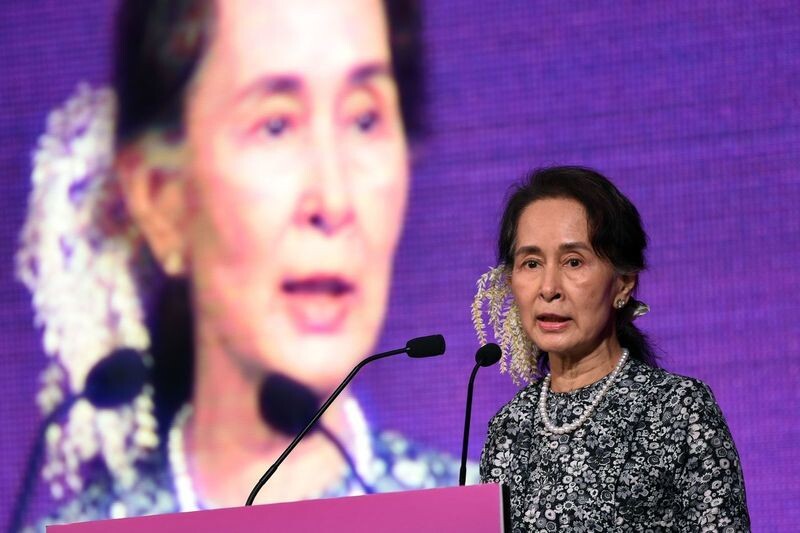hankyoreh
Links to other country sites 다른 나라 사이트 링크
Aung San Suu Kyi gets Gwangju Human Rights Award revoked

Once revered as a symbol of the democratization movement in Asia, Aung San Suu Kyi has suffered the disgrace of having her Gwangju Human Rights Award revoked. The South Korean city of Gwangju is also considering withdrawing Aung San Suu Kyi’s honorary citizenship.
On Dec. 18, the May 18 Memorial Foundation withdrew the Gwangju Human Rights Award it had given to Aung San Suu Kyi, citing her indifference to the massacre of the Rohingya, a minority group in Myanmar.
“Myanmar’s state counsellor and de facto leader Aung San Suu Kyi’s inhumane indifference to the human rights violations perpetrated against the Rohingya goes against the spirit of the Gwangju Human Rights Award, which espouses the values of democracy and human rights,” the May 18 Memorial Foundation said.
Since Sept. 2017, the May 18 Memorial Foundation has been releasing statements signed by foundation staff and other award winners denouncing Aung San Suu Kyi. “For more than a year, we have been sending letters of protest to Aung San Suu Kyi, the Myanmar Ministry of State Counsellor’s Office, the Ministry of Foreign Affairs, and the chief justice of the Supreme Court and calling on them to stop the persecution of the Rohingya, but Aung San Suu Kyi has remained silent,” said a representative for the foundation.
In 2004, the May 18 Memorial Foundation awarded the Gwangju Human Rights award to Aung San Suu Kyi in recognition of her contributions to the democratization movement in Myanmar. In 2013, she was invited to visit Gwangju, where she was given honorary citizenship. “We have completed canvassing international opinion about Aung San Suu Kyi. Once the city has made its decision, we can ask the city council to approval the cancellation of her honorary citizenship here,” a Gwangju spokesperson said on Tuesday.
Aung San Suu Kyi, who had been the center of Myanmar’s democratization movement since 1988,
was awarded the Nobel Peace Prize in 1991, while she was under house arrest. But since she became the de facto leader of the Myanmar government after triumphing in the general election on Apr. 2016, she has been criticized of either ignoring the government’s human rights violations or even actively participating in them.
This past September, the Canadian parliament stripped Aung San Suu Kyi of her honorary citizenship, and in March, the US Holocaust Memorial Museum rescinded an award it had bestowed upon her. In Nov. 2017, the cities of Oxford, England, and Dublin, Ireland, also canceled honorary citizenships they had previously given her. A portrait of Aung San Suu Kyi that had been hanging at Oxford University – where she had studied politics at the age of 15 – was taken down as well.
Last month, human rights advocacy group Amnesty International retracted Aung San Suu Kyi’s Ambassador of Conscience Award. Since last year, there has been growing international support for stripping her of the Nobel Peace Prize as well, but the Nobel Committee has said that its rules don’t allow the award to be revoked.
By Jung Dae-ha, Gwangju correspondent
Please direct comments or questions to [english@hani.co.kr]

Editorial・opinion
![[Column] Park Geun-hye déjà vu in Yoon Suk-yeol [Column] Park Geun-hye déjà vu in Yoon Suk-yeol](https://flexible.img.hani.co.kr/flexible/normal/500/300/imgdb/original/2024/0424/651713945113788.jpg) [Column] Park Geun-hye déjà vu in Yoon Suk-yeol
[Column] Park Geun-hye déjà vu in Yoon Suk-yeol![[Editorial] New weight of N. Korea’s nuclear threats makes dialogue all the more urgent [Editorial] New weight of N. Korea’s nuclear threats makes dialogue all the more urgent](https://flexible.img.hani.co.kr/flexible/normal/500/300/imgdb/original/2024/0424/7317139454662664.jpg) [Editorial] New weight of N. Korea’s nuclear threats makes dialogue all the more urgent
[Editorial] New weight of N. Korea’s nuclear threats makes dialogue all the more urgent- [Guest essay] The real reason Korea’s new right wants to dub Rhee a founding father
- [Column] ‘Choson’: Is it time we start referring to N. Korea in its own terms?
- [Editorial] Japan’s rewriting of history with Korea has gone too far
- [Column] The president’s questionable capacity for dialogue
- [Column] Are chaebol firms just pizza pies for families to divvy up as they please?
- [Column] Has Korea, too, crossed the Rubicon on China?
- [Correspondent’s column] In Japan’s alliance with US, echoes of its past alliances with UK
- [Editorial] Does Yoon think the Korean public is wrong?
Most viewed articles
- 1[Column] Park Geun-hye déjà vu in Yoon Suk-yeol
- 2Thursday to mark start of resignations by senior doctors amid standoff with government
- 3N. Korean hackers breached 10 defense contractors in South for months, police say
- 4[Editorial] New weight of N. Korea’s nuclear threats makes dialogue all the more urgent
- 5Will NewJeans end up collateral damage in internal feud at K-pop juggernaut Hybe?
- 6Kim Jong-un expressed ‘satisfaction’ with nuclear counterstrike drill directed at South
- 7[Editorial] Japan’s rewriting of history with Korea has gone too far
- 8[Column] ‘Choson’: Is it time we start referring to N. Korea in its own terms?
- 9[Cine feature] A new shift in the Korean film investment and distribution market
- 10[Column] The clock is ticking for Korea’s first lady